PMBOK Guide
Contributor and Reviewer of A Guide to the Project Management Body of Knowledge (PMBOK Guide)—Sixth Edition
15 November 2017
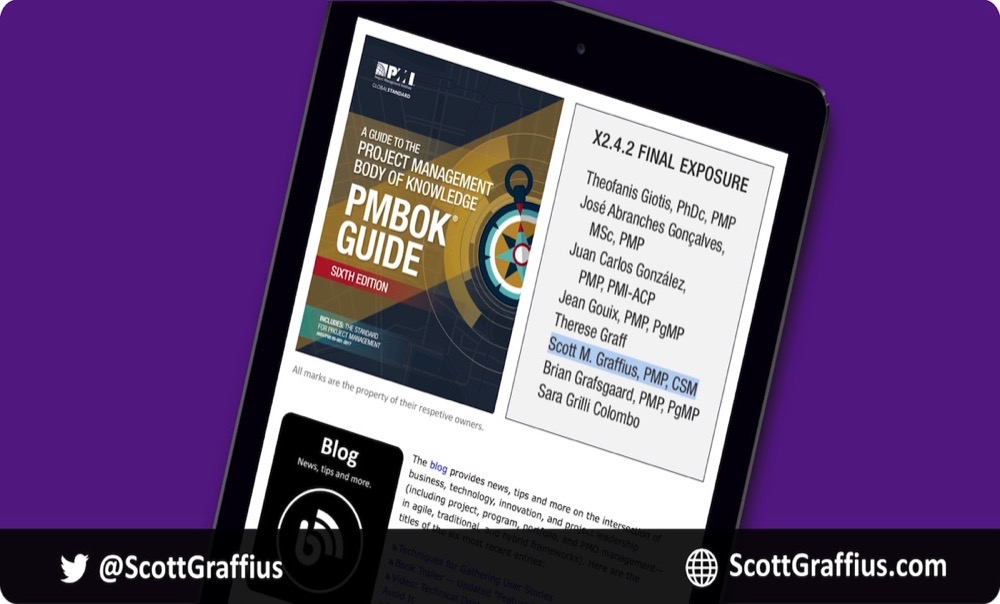
I'm honored to have been a contributor and reviewer of the Project Management Institute's flagship standard, A Guide to the Project Management Body of Knowledge (PMBOK Guide)—Sixth Edition. It includes new content for project delivery professionals working in the entire spectrum of approaches—from traditional (waterfall) to agile methodologies.
https://lnkd.in/g8r_Grd

© Copyright 2017 Scott M. Graffius. All rights reserved. This material may not be published, broadcast, rewritten or redistributed without the express written permission of Scott M. Graffius.

Contributor and Reviewer of Upcoming PMBOK® Guide – Sixth Edition
05 July 2017

I am honored to be a Contributor and Reviewer of the PMI’s A Guide to the Project Management Body of Knowledge (PMBOK® Guide) – Sixth Edition. The PMBOK® Guide reflects evolving knowledge within the profession and is the leading global standard for project management. It has contributed significantly to the advancement of the project management profession worldwide by championing a common lexicon and disseminating generally accepted project management knowledge and practice.
The PMI is scheduled to publish it in Q3 2017.

© Copyright 2017 Scott M. Graffius. All rights reserved. This material may not be published, broadcast, rewritten or redistributed without the express written permission of Scott M. Graffius.

An Error Was Introduced Into the Seventh Edition of 'A Guide to the Project Management Body of Knowledge (PMBOK)'
10 November 2021
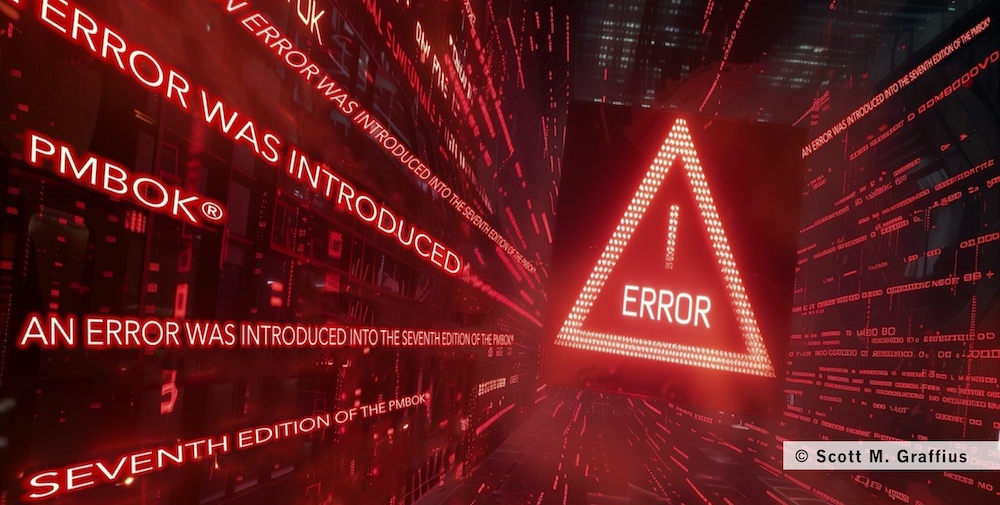
A Guide to the Project Management Body of Knowledge (PMBOK® Guide) is the Project Management Institute’s flagship publication and is a fundamental resource for effective project management in any industry. The book is the global, gold standard for project management.
The PMBOK Guide includes content on the group dynamics model (forming, storming, norming, performing, and adjourning) developed by Bruce Tuckman. The now-prior version of the standard (sixth edition — released on September 22, 2017) covered it correctly. But the new version of the standard (seventh edition — released on August 1, 2021) presents it incorrectly.
As delineated below, the following passage from the PMBOK is blatantly misleading and a significant error: "Bruce Tuckman articulated the stages of team development as forming, storming, norming, and performing. Many people add a fifth stage, adjourning."

Multiple things had to have all gone wrong for the error to be introduced to — and kept in — the new version of the standard. However, mistakes happen, and the Project Management Institute (PMI) has a process to handle such problems.
It created the PMI Standards Program Comment Form. If/when errors are discovered, the PMI instructs individuals to share findings by completing the form and emailing it to the PMI. The form will then be sent to the next team assigned to review and update the respective standard. The form has two main sections: Comment and Suggested Change.
Here are some excerpts from what Graffius provided to the PMI (shown in purple font).
What Graffius provided in the comment section of the PMI Standards Program Comment Form:
Section 4.2.6.1 Tuckman Ladder includes: “Bruce Tuckman articulated the stages of team development as forming, storming, norming, and performing. Many people add a fifth stage, adjourning.”
The passage is misleading and incorrect. Here’s why. In 1965, Bruce Tuckman introduced his model inclusive of four stages: forming, storming, norming, and performing. (The source/citation: Tuckman, B. W. (1965). Developmental Sequence in Small Groups. Psychological Bulletin, 63: 384-399.) However, Tuckman subsequently discovered adjourning to be so important that he updated his own model in 1977 to include adjourning. (The source/citation: Tuckman, B. W., & Jensen, M. A. C. (1977). Stages of Small-Group Development Revisited. Group and Organizational Studies, 2 (4): 419- 427.) Tuckman says there are five stages: forming, storming, norming, performing, and adjourning. By not including that relevant, informative, and helpful fact — and instead vaguely saying “Many people add a fifth stage, adjourning.” — the passage is misleading and incorrect.
What Graffius provided in the suggested change section of the PMI Standards Program Comment Form:
For the reason detailed in the Comment section of this form, I suggest changing the passage from “Bruce Tuckman articulated the stages of team development as forming, storming, norming, and performing. Many people add a fifth stage, adjourning.” to:
“Bruce Tuckman articulated the stages of team development as forming, storming, norming, performing, and adjourning.”
or
“Bruce Tuckman articulated the stages of team development as forming, storming, norming, performing, and adjourning. He introduced the first four stages in 1965, and he added the fifth stage when he updated his model in 1977.”
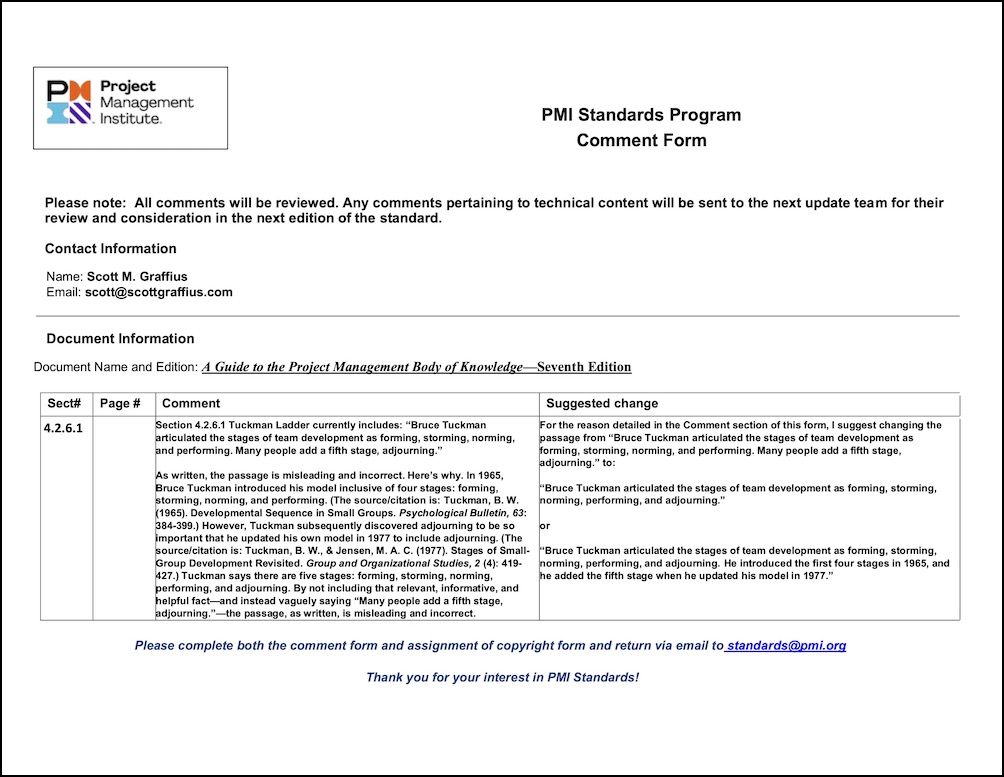
Page 1 of the PMI Standards Program Comment Form (completed) is shown above.
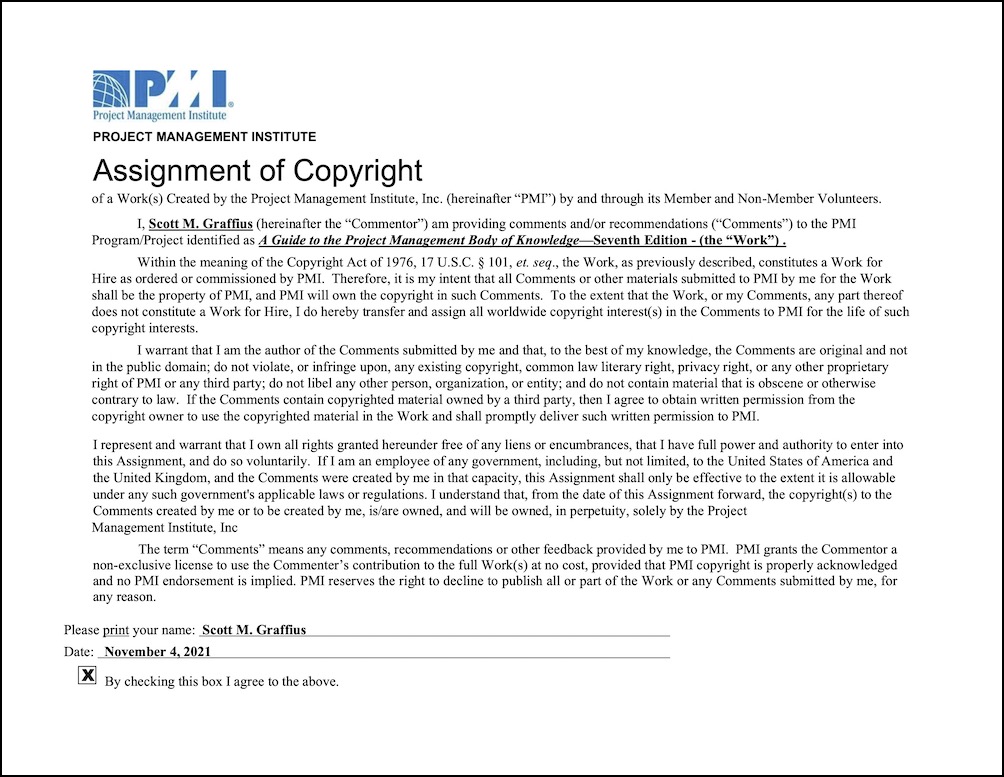
Page 2 of the PMI Standards Program Comment Form (completed) is shown above.
Graffius emailed the Standards Program Comment Form to the PMI on November 4, 2021.




Post-Publication Notes
If there are any supplements or updates to this article after the date of publication, they will appear here.
The article was published on November 10, 2021. On November 18, 2021, Project Management Institute (PMI) staff sent Graffius an email which acknowledged receipt of Graffius' report of the error. On November 23, 2021, PMI sent Graffius a follow-up email. It stated that the error will be corrected during the next print run of the A Guide to the Project Management Body of Knowledge. Reportedly, the updated (corrected) content will read: "Bruce Tuckman articulated the stages of team development as forming, storming, norming, performing and adjourning."
The article was published on November 10, 2021. A related story — 'The Protocol for Reporting an Error to an Author or Publisher' — was published on March 22, 2024.


About Scott M. Graffius

Scott M. Graffius, PMP, CSP-SM, CSP-PO, CSM, CSPO, SFE, ITIL, LSSGB is an agile project management practitioner, consultant, award-winning author, and international speaker. He has generated over 1.75 billion dollars of business value in aggregate for the organizations he has served. Graffius is the founder, CEO, and principal consultant at Exceptional PPM and PMO Solutions™ and subsidiary Exceptional Agility™, based in Los Angeles, California. His expertise spans project, program, portfolio, and PMO leadership inclusive of agile, traditional, and hybrid approaches. Content from his books (Agile Scrum and Agile Transformation), workshops, speaking engagements, and more have been featured and used by businesses, governments, and universities including Gartner, Microsoft, Deloitte, Oracle, Cisco, Ford, Qantas, Atlassian, Bayer, the National Academy of Sciences, the United States Department of Energy, the United States Army, Project Management Institute, the IEEE, the New Zealand Ministry of Education, Tufts University, Texas A&M University, Virginia Tech, Penn State, Warsaw University of Technology, University of Waterloo, Loughborough University London, and others. Graffius has spoken at 58 conferences and other events around the world, including Armenia, Australia, Brazil, Canada, Czech Republic, Finland, France, Germany, Greece, India, Ireland, Lithuania, Luxembourg, Netherlands, New Zealand, Sweden, United Kingdom, and the United States. Thinkers360 named Graffius a global top thought leader and influencer in four domains: Agile, Change Management, Digital Transformation, and GovTech.
His full bio is available here.
Connect with Scott on:
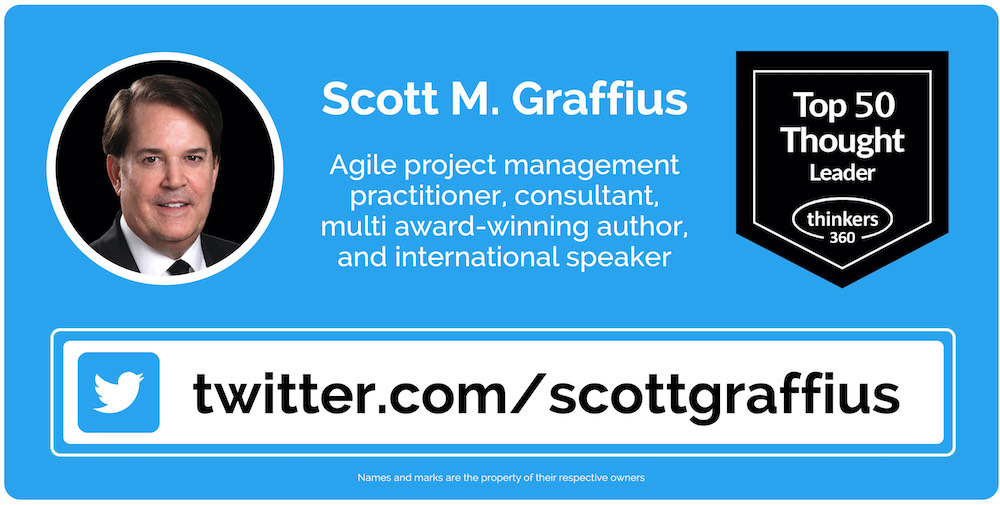

About Agile Scrum: Your Quick Start Guide with Step-by-Step Instructions
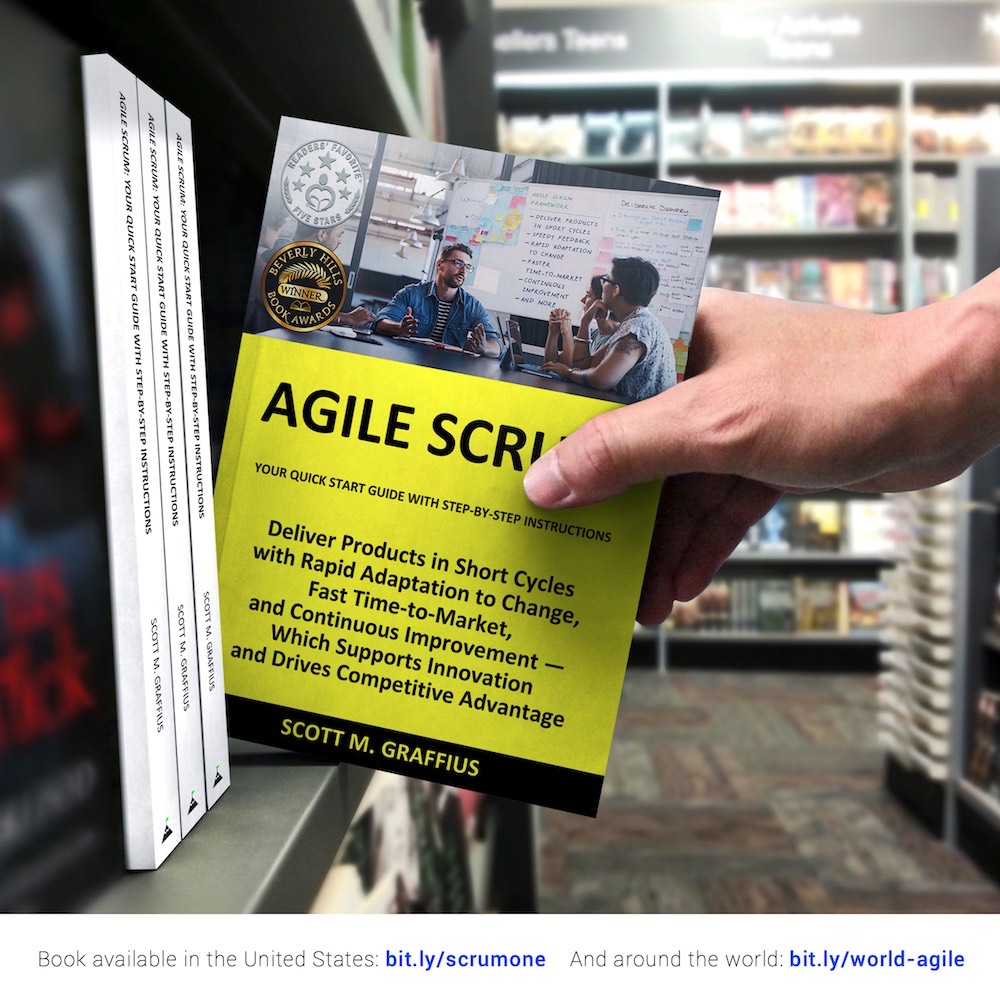
Shifting customer needs are common in today's marketplace. Businesses must be adaptive and responsive to change while delivering an exceptional customer experience to be competitive.
There are a variety of frameworks supporting the development of products and services, and most approaches fall into one of two broad categories: traditional or agile. Traditional practices such as waterfall engage sequential development, while agile involves iterative and incremental deliverables. Organizations are increasingly embracing agile to manage projects, and best meet their business needs of rapid response to change, fast delivery speed, and more.
With clear and easy to follow step-by-step instructions, Scott M. Graffius's award-winning Agile Scrum: Your Quick Start Guide with Step-by-Step Instructions helps the reader:
- Implement and use the most popular agile framework―Scrum;
- Deliver products in short cycles with rapid adaptation to change, fast time-to-market, and continuous improvement; and
- Support innovation and drive competitive advantage.
Hailed by Literary Titan as “the book highlights the versatility of Scrum beautifully.”
Winner of 17 first place awards.
Agile Scrum: Your Quick Start Guide with Step-by-Step Instructions is available in paperback and ebook/Kindle in the United States and around the world. Some links by country follow.
- 🇧🇷 Brazil
- 🇨🇦 Canada
- 🇨🇿 Czech Republic
- 🇩🇰 Denmark
- 🇫🇮 Finland
- 🇫🇷 France
- 🇩🇪 Germany
- 🇬🇷 Greece
- 🇭🇺 Hungary
- 🇮🇳 India
- 🇮🇪 Ireland
- 🇮🇱 Israel
- 🇮🇹 Italy
- 🇯🇵 Japan
- 🇱🇺 Luxembourg
- 🇲🇽 Mexico
- 🇳🇱 Netherlands
- 🇳🇿 New Zealand
- 🇳🇴 Norway
- 🇪🇸 Spain
- 🇸🇪 Sweden
- 🇨🇭 Switzerland
- 🇦🇪 UAE
- 🇬🇧 United Kingdom
- 🇺🇸 United States

About Agile Transformation: A Brief Story of How an Entertainment Company Developed New Capabilities and Unlocked Business Agility to Thrive in an Era of Rapid Change
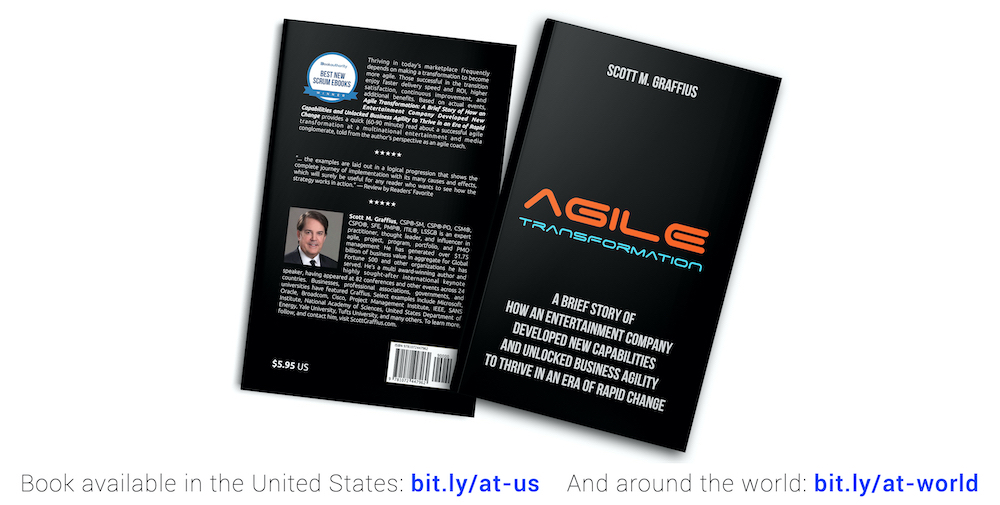
Thriving in today's marketplace frequently depends on making a transformation to become more agile. Those successful in the transition enjoy faster delivery speed and ROI, higher satisfaction, continuous improvement, and additional benefits.
Based on actual events, Agile Transformation: A Brief Story of How an Entertainment Company Developed New Capabilities and Unlocked Business Agility to Thrive in an Era of Rapid Change provides a quick (60-90 minute) read about a successful agile transformation at a multinational entertainment and media company, told from the author's perspective as an agile coach.
The award-winning book by Scott M. Graffius is available in paperback and ebook/Kindle in the United States and around the world. Some links by country follow.
- 🇦🇺 Australia
- 🇦🇹 Austria
- 🇧🇷 Brazil
- 🇨🇦 Canada
- 🇨🇿 Czech Republic
- 🇩🇰 Denmark
- 🇫🇮 Finland
- 🇫🇷 France
- 🇩🇪 Germany
- 🇬🇷 Greece
- 🇮🇳 India
- 🇮🇪 Ireland
- 🇯🇵 Japan
- 🇱🇺 Luxembourg
- 🇲🇽 Mexico
- 🇳🇱 Netherlands
- 🇳🇿 New Zealand
- 🇪🇸 Spain
- 🇸🇪 Sweden
- 🇨🇭 Switzerland
- 🇦🇪 United Arab Emirates
- 🇬🇧 United Kingdom
- 🇺🇸 United States

About the Project Management Institute
The Project Management Institute (PMI) is the world's leading professional association for a growing community of millions of project professionals and change-makers worldwide. As the leading authority on project management, the PMI empowers people to make ideas a reality. Through global advocacy, networking, collaboration, research, and education, the PMI helps prepare organizations and individuals to work smarter in a dynamic and rapidly changing world.
Building on a prominent legacy dating to 1969, the PMI is a “for-purpose” organization working in nearly every country around the world to advance careers, strengthen organizational success, and enable change-makers with new skills and ways of working to maximize their impact. The PMI provides global standards, certifications, online courses, thought leadership, tools, digital publications, communities, and more.
To learn more about the PMI, visit https://www.pmi.org/.

The short link for this article is: https://bit.ly/pmbk-7
© Copyright 2021 Scott M. Graffius. All rights reserved. This material may not be published, broadcast, rewritten or redistributed without the express written permission of Scott M. Graffius.

